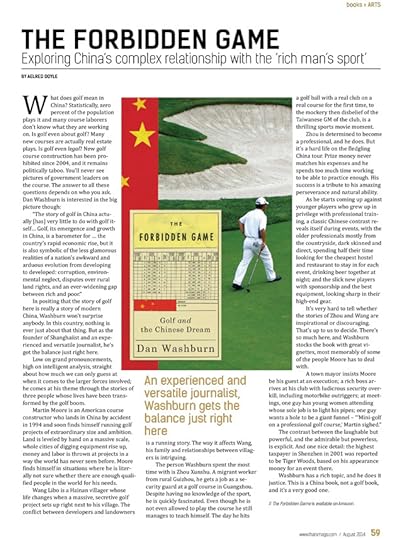Dan Washburn's Blog, page 6
September 14, 2014
Watch: Dan Washburn and ESPN’s Jeremy Schaap discuss The Forbidden Game in New York
Recorded Thursday, September 4, 2014, at Asia Society in New York. Watch the complete program:
Or a highlight, entitled ‘The Other Side of the Chinese Dream':
Why Obama’s golf gaffe would never happen in China: My story in The World Post
In this day and age, we’ve come to expect to see images of U.S. presidents gracing gossip websites and the covers of tabloid newspapers. But rarely, as it was recently, is golf at the heart of the discussion.
After breaking briefly from a two-week vacation on Martha’s Vineyard to publicly address the savage beheading of American journalist James Foley at the hands of Islamic State militants, Barack Obama headed straightaway to Vineyard Golf Club for a round of golf. Photos showed him on the course, grinning and fist-bumping with the likes of former NBA star Alonzo Mourning and millionaire investor Glenn Hutchins.
Critics from both sides of the political spectrum said the president’s actions were “tone deaf” and in “bad taste.” Deputy White House Press Secretary Eric Schultz had to come to his boss’s defense, saying “sports and leisure activities are a good way for release and clearing of the mind.”
No matter where your opinion falls on this particular controversy, one thing is clear: Something like this would never happen in China. Because high-ranking Chinese officials know if they get caught on the links, it would be political suicide.
Read the rest at The World Post.
The Australian calls Forbidden Game ‘a wake up call’
Glenda Korporaal writes:
An award-winning American reporter who lived in China for 10 years, Washburn uses stories about these people involved in the booming golf business to provide an insight into the China dream that has had a tectonic impact on the world, and the Australian economy in particular. Anyone trying to come to grips with the rise of modern China or thinking about doing business there will receive some comfort that they are not alone in their confusion about how the place works. …
Written with a wry sense of humour about the contradictions of modern China, it chronicles a country in a hurry, where official edicts from Beijing are ignored or circumvented — confirming the old Chinese saying that “the mountain is high and the emperor is far away”, where fast moving operators in the know can make their fortune while poor peasants can find their livelihoods crushed underfoot. …
The book shows how the opening up of China has unleashed a fierce determination among the people — or sizeable proportion of the population at least — to seize the chance to better themselves with hard work, initiative and a dash of rat cunning.
Sitting back in comfortable Australia it’s a bit of a wake up call about where China is going as the breakneck change of the past two decades continues.
Read the complete review here.
September 3, 2014
Video: Experience China’s ‘Forbidden Game’ in 30 riveting seconds
In advance of my New York book event tomorrow at Asia Society, my colleagues at ChinaFile put together a nice little 30-second teaser video, which is embedded above.
If the video piques your interest, and you happen to be in the New York area, stop by 725 Park Avenue at 6:30 pm on Thursday, September 4. ESPN’s Jeremy Schaap is moderating. Should be a good time.
Complete event details can be found here.
Not in New York? I’ve got Forbidden Game events coming up in San Francisco, Los Angeles, Chicago and Houston. Look here for details soon.
August 6, 2014
New York Times Sinosphere blog interviews Dan Washburn about Forbidden Game
From the Q&A with New York Times reporter Austin Ramzy:
What were your first interactions with golf like in China? Did you play much while you lived in Shanghai?
I actually don’t golf, so it’s a good thing my book isn’t a how-to. My first interactions with the game in China were as a reporter. One of the first tournaments I covered was the inaugural HSBC Champions in Shanghai, notable because it was Tiger Woods’ first time competing in an official event in China. I was on assignment for ESPN.com and wanted to do something a little different than the other journalists crowding the media center. So I left. I walked beyond the gates of the golf club in search of a story. It wasn’t long before I happened upon a community of migrant workers, many of whom were on forced unpaid leave from their jobs at a nearby door-and-window factory because tournament organizers didn’t want the manufacturing noise to affect the golfers. The contrast between these two neighboring worlds was striking. A membership at Sheshan International Golf Club was $148,000 at the time; furnished villas were going for $2 million. Meanwhile, these villagers were living in shacks. If anyone was looking for a vivid illustration of China’s yawning income gap, there it was. Not surprisingly, no one I talked to outside the golf club had any idea who this Tiger Woods guy was.
Read the rest at The New York Times.
That’s Shanghai review: Forbidden Game ‘gets the balance just right’
Washburn has a rich topic, and he does it justice. This is a China book, not a golf book, and it’s a very good one.
Read the review by Aelred Doyle below (click the image for a larger version), or download the entire August 2014 issue at That’s Shanghai.
Dan Washburn’s Q&A with The Diplomat about China’s Forbidden Game
From the Q&A with Justin McDonnell:
How did Forbidden Game come to fruition?
I guess you could say it’s been nearly a decade in the making. Not long after I started writing about the topic, I realized the story of golf in China is much bigger than golf itself. Ever since golf reemerged in China 30 years ago, its growth has served as a barometer for China’s economic rise. But golf’s enduring reputation as an elitist, land-and-water-hungry pursuit runs counter to nearly every stated focus of the Chinese government. Golf is a symbol of corruption, rural land rights disputes, environmental neglect, the growing gap between rich and poor, and a shrinking supply of arable land. In many ways golf, and the complex world that surrounds it in China, is a microcosm of the contradictory country as a whole.
But I didn’t want this to be a dry work of nonfiction – a chapter on this topic, a chapter on that topic. I wanted it to be alive and character-driven. So that’s when I decided to tell the story from the perspective of three men caught up in China’s bizarre golf scene in very different ways. Their stories intertwine and intersect, and make the book much more show than tell. But to do it correctly required a large investment of time. I hope the end result was worth the wait.
Read the rest at The Diplomat.
July 27, 2014
Shelf Awareness: Forbidden Game ‘insightful’ and ‘delightful’
Tom Lavoie writes:
Washburn’s extensive research and his breezy, reporter’s style make this insightful book both educational and delightful.
Read the entire review at Shelf Awareness.
Read an excerpt from Dan Washburn’s The Forbidden Game in Quartz
Despite Beijing’s golf course moratorium, some big developers have continued to show a remarkable ability to manage and massage guanxi with local government officials. Without the right connections, it would never have been possible to operate on the grand scale needed to build a golf resort. And managing and massaging guanxi was often a very tangible business. Sources familiar with one company said that before launching a large golf course construction project in Guangdong, the developer outfitted the local police department with a new fleet of motorcycles. On Hainan island, it was said the company built the county a brand new government office building during the negotiations over another large golf-related development. That land deal fell through, but the building, or at least the shell of it, remained. “It’s sitting there like a big old white elephant,” a local source said. “That’s development in China right there.”
Read the rest of “To get a golf course built in China, call it a ‘resort’” at Quartz.
Rean an excerpt from Dan Washburn’s The Forbidden Game in Quartz
Despite Beijing’s golf course moratorium, some big developers have continued to show a remarkable ability to manage and massage guanxi with local government officials. Without the right connections, it would never have been possible to operate on the grand scale needed to build a golf resort. And managing and massaging guanxi was often a very tangible business. Sources familiar with one company said that before launching a large golf course construction project in Guangdong, the developer outfitted the local police department with a new fleet of motorcycles. On Hainan island, it was said the company built the county a brand new government office building during the negotiations over another large golf-related development. That land deal fell through, but the building, or at least the shell of it, remained. “It’s sitting there like a big old white elephant,” a local source said. “That’s development in China right there.”
Read the rest of “To get a golf course built in China, call it a ‘resort’” at Quartz.




